TISM’s return ‘a refreshingly fun celebration of vulgarity and Aussie humour’
On TISM’s first album in 20 years, its sprawling 80-minute, 29-song tracklist justifies its place in the oddball canon of this band of defamatory disco-punks, and holds up to repeat listens.

Album reviews for week of October 11 2024:
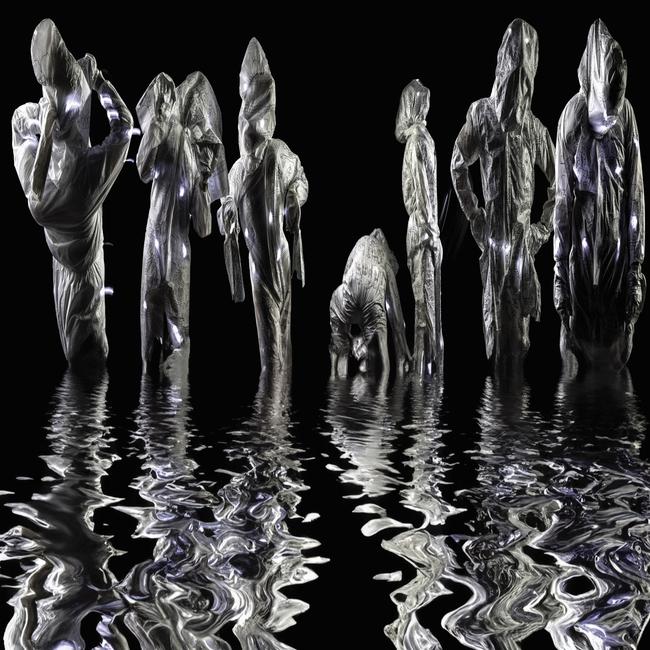
ALTERNATIVE
Death to Art
TISM
Genre B. Goode
“Ladies and gentlemen. TISM are back … and we sincerely apologise.’’ So proclaims Ron Hitler-Barassi in the whispery, piano-led intro to blue-light disco dreamer C..ts Vs C..ts. And suddenly all seems right in the world. It turns out the seismic hole in the Australian music scene wasn’t that Triple J didn’t feel quite as cool anymore, it wasn’t the lack of cool rock festivals like Big Day Out or Homebake, or the disintegration of grassroots live music in the capitals – it was the absence of everyone’s favourite masked, defamatory disco-punks that even the current PM loves. From the opening chords of the propulsive opener Old Skool TISM, it’s clear the passage of time has done nothing to blunt the band’s masterful fusion of retro dance music and trad-punk, with further cuts I Can’t Wait for Everyone In My Generation to Die and The “C” Word adding splashes of ska and even arena rock to the mix. A lot has changed since the release of the band’s last effort, The White Albun (2004). Three US presidential administrations, the emergence of a whole new realm of online communication, Australia entering Eurovision (and again, TISM have a prime ministerial endorsement should they make a bid), and a continually evolving and growing AFL are just some of the cultural shifts that have radically altered the world receiving Death to Art.
Naturally, a changing world brings new targets for TISM’s ire in its lyrics. Tracks such as Everybody Needs Somebody To Hate and Cabal of Bozos (Dedicated to Australia’s Laziest Class, the Australian Business Class) reflect on both cancel culture and cultural elites, while My Man’s Band’s T-shirt is a Salvation Army hymn reworked for the local musos slogging it out to a few dozen in the front-bars of venues around the country – a concerningly regular occurrence in 2024. Truth be told, no matter when TISM releases an album, there’ll never be a lack of content to riff on – what matters here is the music, and it broadly delivers, despite 20 years off the tools. Highlights arrive in the wonderful I’ve Gone Hillsong, which offers the record’s first “proper” riff — anchored by a cheap-sounding drum machine offering a wonderfully obnoxious four-on-the-floor — and aforementioned The “C” Word, which brings an unexpected pirate-rock element to proceedings.
Admittedly, the decrying of cancel culture and rich boomers wears thin after a while – and the scattering of interludes tracking a road trip to Springvale becomes a bit irritating. However, broadly speaking, Death to Art is a refreshingly fun celebration of vulgarity, Aussie humour, and the novelty of punk reworked for a blue light disco: 29 songs across 80 minutes is a lot of TISM to deal with – but while some editing wouldn’t have hurt, the songs themselves justify their place in the TISM canon, and hold up to repeat listens. As the freshly coined adage in Old Skool TISM has it: “Everything is shit, except for TISM.”
Alasdair Belling

ALTERNATIVE ROCK
Megaflower
Full Flower Moon Band
Independent
Frontwoman Kate Dillon named Full Flower Moon Band’s third album Megaflower not because it flaunts the three-guitar line-up of the Brisbane act’s recent touring configuration but because the record covers a lot of different ground with equal intensity. So as much as Dillon is a natural when it comes to leading downcast dirges, there’s much more smoky subtlety than one-note heaviness here. Illegal Things and Baby are mellower and sweeter, only for West Side to inhabit dark stoner-rock energy and Enemy to flirt with vintage Stones-y swagger. The five-piece band sounds road-tested in all the right ways, navigating those shifting moods without breaking a sweat. Dillon’s production often prevents us from hearing her voice unobscured by distortion or effects, but that added crunch does deepen the album’s shadowy allure. That said, her singing is so lovely and unadorned on the closing ballad Kiss Him Goodbye that it leaves one wishing for more moments like that one. Nobody who comes to Megaflower for brooding, lurching alt-rock should walk away disappointed.
Doug Wallen

POP
Beautifully Ordinary
Tones and I
Bad Batch Records/Sony
Toni Watson must have felt serious pressure to live up to her 2021 debut Welcome to the Madhouse, whose joyous earworm Dance Monkey topped many charts around the world. The Victorian multi-hyphenate doesn’t try to replicate that fluke here, though she still has a real knack for percolating, pocket-sized anthems. Drawing closely on her familial and romantic relationships, Watson often lingers on how we process the past. The opening piano ballad To Be Loved is especially affecting, with its Sia-esque vocal breakout and unguarded lyrics about the ongoing quest for self-worth. That song later gets a fitting bookend in the club-driven Call My Name, co-written with Jenna Andrews (BTS, Drake). Other highlights include the stalker-inspired You Don’t Know Me Like That and the family portrait Sorrento, but there’s a growing sense of repetitive dynamics and some filler across these 16 tunes. Yet when she breaks out 1980s-style drum pads on I Get High, we’re reminded why Watson struck a chord in the first place: by elevating personal revelations to shareable triumphs of memory and melody.
Doug Wallen

JAZZ
Volant
Matthew Ottignon
Earshift Music
This is a very beautiful album that has given me immense pleasure. Saxophonist Matthew Ottignon has indicated that by enlisting the services of pianist Lauren Tsamouras, acoustic bassist Hannah James and drummer/percussionist Holly Conner, he was striking a blow for gender equality. The presence of three women musicians, however, has in no way diluted Ottignon’s apparent purpose of delivering a strong statement in the acoustic jazz tradition best exemplified by the classic John Coltrane Quartet; if anything, their contributions have bolstered its overall appeal. Eight excellent and highly interesting Ottignon compositions are played here across 39 minutes. Still, the most distinctive aspect of Volant is the artistry of Ottignon himself, who has a very individual sound on the saxophone, with a wide diversity of tone colours to call upon: for example, extremely guttural, moderately guttural, a liberal vibrato when needed, a light feathery tone when necessary in the more minimal numbers. And his imagination as an improviser is uniquely fertile. Here is a genuine saxophone virtuoso at work, backed by a full-blooded rhythm section that takes no prisoners, and that is with him all the way.
Eric Myers

INDIE ROCK
Enough of the Sweet Talk
Lime Cordiale
Chugg Music
There’s an adage: if you want a snapshot of what society will look like two decades from now, take a look at what’s happening on university campuses. This can be applied to Australian music, too. If you’re wondering what every guitar band at a (surviving) music festival will sound like over the next half-decade or so, give the latest Lime Cordiale a listen. The Sydney sibling duo has had a long career already, but more recently has found itself a sonic trendsetter. So what does the next crop of festival acts sound like? It sounds like blissed-out indie rock reminiscent of early Tame Impala or – whisper it – Sticky Fingers (a band whose shadow continues to hang over the Aussie indie rock scene). Louis Leimbach brings chilled vibes to easy-goers like Facts of Life, Imposter Syndrome, and Strangers, and it’s only really on The Milkman and Country Club – the latter boasting a hook reminiscent of past favourites Art Vs. Science – where things stray into more adventurous territory. But no matter; Lime Cordiale are experts at executing a solid, laid-back experience. If they lost the needless interludes, things would be notably better – but as they stand, the future of Aussie rock is restrained, summery, beachy indie rock … and there’s nothing wrong with that.
Alasdair Belling
Album reviews for week of October 4 2024:

COUNTRY
Backbone
Kasey Chambers
Essence Music / MGM
The reverence with which Kasey Chambers is held by her fan base is without question. The unassuming queen of Australian country music commands universal respect across more than two decades of brutal honesty; of laying bare her soul in a slew of albums and countless live shows. And this, indeed, is her hallmark: her songs are rarely less than bruise-purple and raw, and the pure truth with which she writes and sings is the reason she is so loved. On her 13th album — which arrives 25 years after the incredible success of her solo debut, The Captain — Chambers doesn’t let up. In fact, if it were even possible, Backbone sees this inimitable artist hit heights heretofore unimaginable, acting as it does as somewhat of a memoir of her life thus far, delving deep into the highs and lows (and there have been plenty of both) that have defined her life, her times, her music, since she struck out on her own all those years ago. As a companion to her new book, Just Don’t Be A Dickhead, Backbone takes the tales related within and gives them power and musical life. Opener A New Day Has Come sets the emotional scene with its mournful pedal steel accompanying a song about hope; “Everything’s gonna be all right,” she repeats as a mantra, while the song fades to a close.
Survival is a sub-theme of the album; the notion that despite how bad things can be, Chambers has pulled through, and so is here today delivering these very songs. Through this, she sings of her children, of longing for a love akin to hers of Springsteen, of losing love and finding it again. Of the former, she duets with ex-husband Shane Nicholson for the first time in over a decade on the aptly titled — yet jaunty and fun — The Divorce Song, wherein their harmonies are as rough-yet-sweet as they always were. Little Red Riding Hood and Dart ‘n Feather move things across to the dark and smoky chain-rattlin’ style of country music, which adds strong foundation points to an album which, for the most part, is more intricate and emotional than loose and ribald. (Silverado Girl is a prime example, so too the hymnlike My Kingdom Come, featuring Ondara.) Chambers’ father Bill adds his timeless guitar stylings to proceedings, as does Sam Teskey and current partner Brandon Dodd, while long-time bassist Jeff McCormack keeps impeccable time, along with American drummer Brady Blade (Emmylou Harris, Steve Earle, Lucinda Williams). Backbone closes in spectacular fashion with a reimagining of Eminem’s Grammy-winning Lose Yourself, recorded live at Newcastle’s Civic Theatre in June 2022. The song’s opening salvo is sparse, almost desolate, but it leaks into a second act that bursts forth, crashing and churning before finally dying, raucous applause carrying on unabated, only ending when engineer Nash Chambers fades the song out and closes an album which sees Kasey Chambers once again laying herself bare. Nothing hidden, nothing exaggerated; just the truth.
Samuel J. Fell
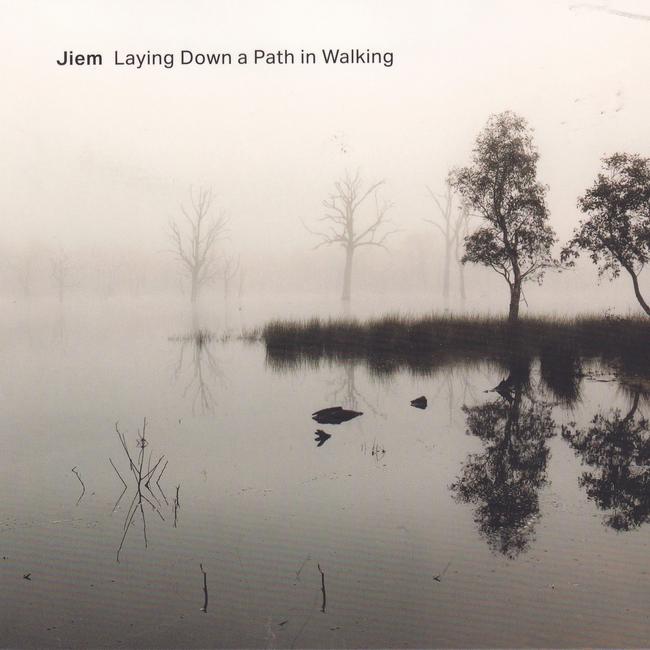
JAZZ
Laying Down a Path in Walking
Jiem
Earshift Music
I have rarely heard a more moving and inspiring debut album than this one from Jiem. Listen to the opening solos from alto saxophonist Tessie Overmyer and trumpeter Miles Rooney, which throw down the gauntlet. These are clear statements of intent: we are here, this is our music, and we want this album to count. Jiem is a brilliant quintet also including Matthew Harris (piano), Harry Birch (double bass) and – as the essential character of this music comes from the drums – a busy and dynamic drummer in Ryu Kodama. Eight original compositions are played, five by Rooney, two by Harris, and one by Overmeyer. Much of the music here is no-holds-barred, but nonetheless the whole gamut of current impulses in modern jazz is covered, from measured and restrained to freewheeling high energy, including chaos. In the case of Overmyer, she’s been heard often in Sydney playing short cameo solos in other people’s bands. It’s a tonic to hear her playing at length so assertively in her own right as part of Jiem.
Eric Myers
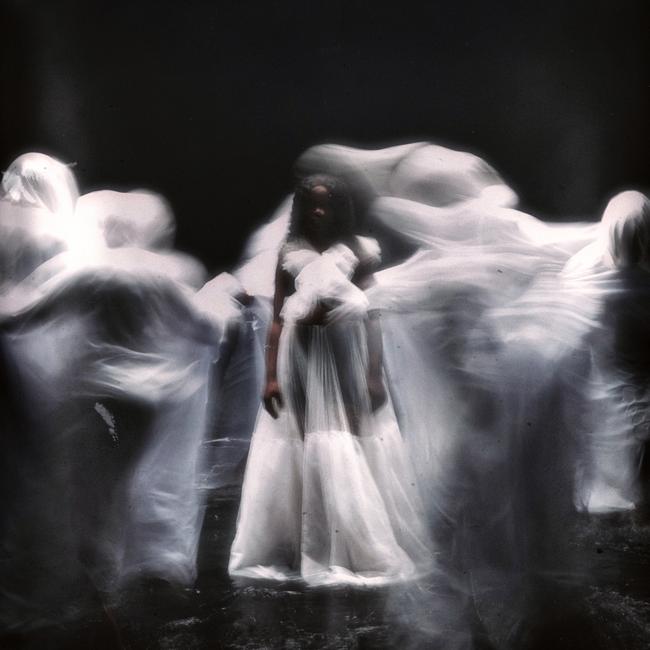
HIP-HOP
Saint Sinner
Elsy Wameyo
Music In Exile
For a small port city, Adelaide has produced an outsize number of rap acts. Elsy Wameyo, who moved to South Australia from Kenya as a child, is its latest star. Her “kitchen sink” approach to production and performance has led to thrilling results on previous singles, as has her insistence on using live instrumentation. That tightness and energy doesn’t entirely translate on her first album, an ambitious double LP. At its height, it locks into the groove and recalls the bombast of Kanye doing Jesus Walks or Monster. But many of its tracks get muddled by its overdone exploration of spirituality. Wameyo, who is a solid singer and an exciting rapper, shines brightest when twisting lyrics at warp speed on cuts like Umva and Quagmire. But while the exploration of the sounds of her heritage is compelling, they’re often brought down by mid-tempo, drill-inspired beats that lose the flow for the listener. Electric tracks like the snaking Afro-Beat Conquer get it right – and there’s certainly enough of them. It’s a shame they’re let down by an unnecessary format.
Jonathan Seidler
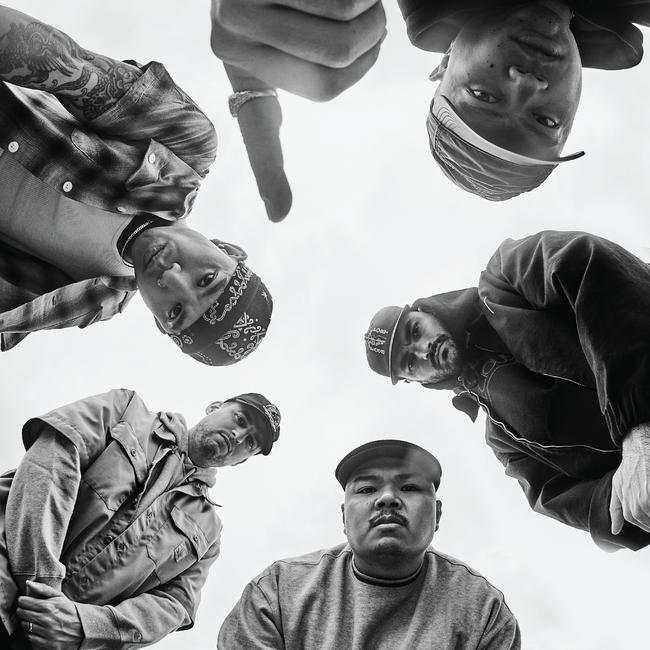
HARDCORE
Only One Mode
Speed
Last Ride / Flatspot Records
Only One Mode is more than an album title for Sydney hardcore group Speed – it’s a whole ethos. The group’s rise to notoriety and success internationally is unprecedented; within the past two years, Speed has earned co-signs from the likes of Travis Barker to Post Malone, and secured coveted spots on Coachella and Knotfest line-ups, all the while producing music that is relentless and emotionally charged. Their debut album is visceral and strong in its core identity and vision. Refusing to be placated, Speed’s rhythmic intensity never wavers (Real Life Love, Shut It Down); frontman Jem Siow’s venomous growls are matched by expansive arrangements built by Aaron Siow (bass), Dennis Vichidvongsa and Josh Clayton (guitars), and Kane Vardon (drums). The lyrical output of the album uplifts the marginalised while offering a fresh perspective and take on modern hardcore (The First Test, Kill Cap), specifically the Sydney scene. Robust, bold and exciting, Speed represents something new in terms of sound and culture pushing Australian hardcore forward. Only One Mode equates to only one way to go for this group – and that way is up.
Sosefina Fuamoli
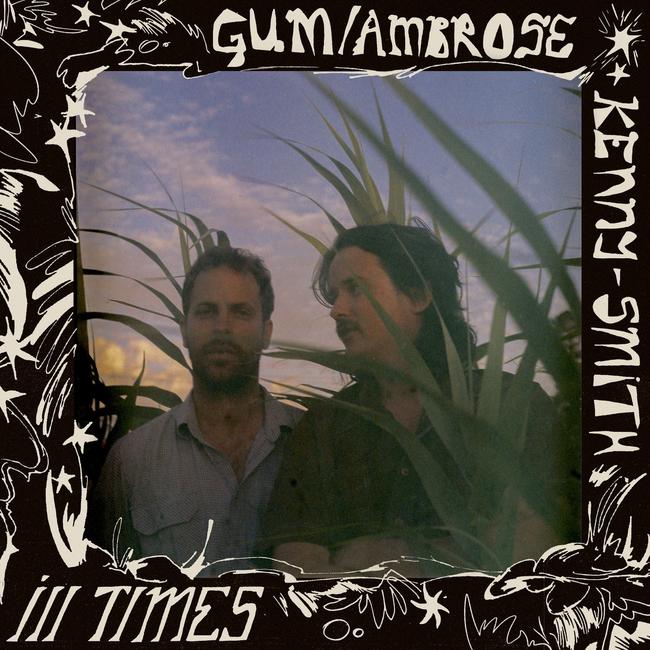
PSYCHEDELIC POP
Ill Times
GUM & Ambrose Kenny-Smith
P(doom)
Jay Watson (Pond, Tame Impala) and Ambrose Kenny-Smith (King Gizzard & The Lizard Wizard, The Murlocs) play in some of Australia’s best-loved bands, on top of Watson’s solo work as GUM. Yet their debut collaboration is more comfort food than supergroup, with the pair finding a sweet spot in layered psych that wobbles earnestly into throwback funk, soul and blues. They initially found a common touchstone in Eric Burdon & War’s 1976 tune Magic Mountain, and here they do a loving version of Curtis Mayfield’s Impressions-era 1968 ballad Fool for You. In the end, Ill Times simply provides an affable overlap for what these guys do best: Watson’s cosmic synths and dramatic drum fills and Kenny-Smith’s smoky, falsetto-licked vocals and bleating harmonica. While most of these low-stakes tracks stick to the mantra repeated on Emu Rock – “Keep it simple / Don’t overdo it” – two grander statements arrive at the record’s very end. Marionette flaunts one of Kenny-Smith’s strongest vocal turns, before the closing duet The Gloater launches into satisfyingly spacey reaches.
Doug Wallen




